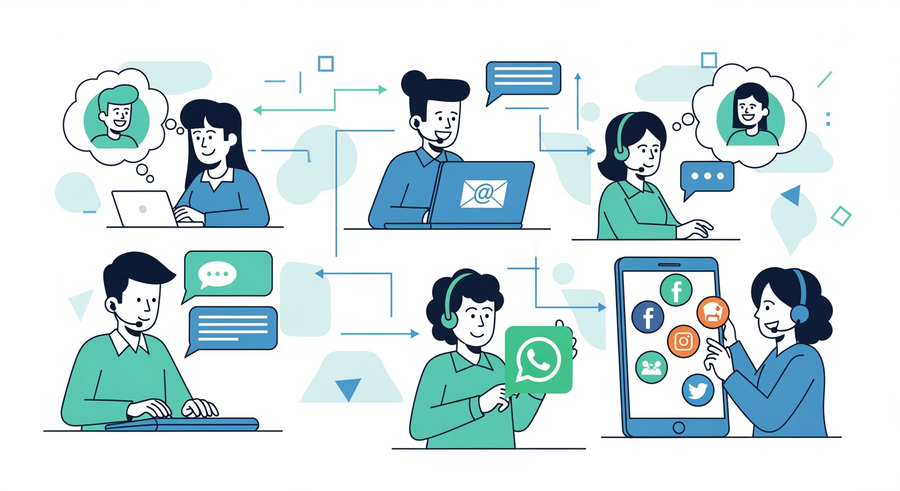Agentic AI represents the next evolution in artificial intelligence, moving beyond reactive systems to autonomous, goal-driven agents capable of solving complex, multi-step problems. Unlike traditional AI, which operates within predefined parameters, agentic AI systems independently analyze data, make decisions, and execute actions to achieve specific objectives. This transformative technology is reshaping industries by automating workflows, enhancing productivity, and driving innovation. For instance, in customer service, an agentic AI system can not only respond to inquiries but also proactively manage tasks like resolving account issues or recommending solutions—all without constant human oversight.
In this blog, we’ll explore what agentic AI is, how it works, and how businesses can start building their own agentic AI systems to unlock new levels of productivity and innovation.
What is Agentic AI?
Agentic AI is a groundbreaking technology that is changing the way artificial intelligence operates. Unlike traditional AI systems that rely on predefined rules or reactive responses, agentic AI introduces autonomous agents capable of analyzing data, setting goals, and taking actions with minimal human involvement. These agents can make decisions, solve dynamic problems, and continuously learn from their interactions to improve over time.
This form of AI uses probabilistic methods to adapt to changing environments and events, making decisions based on patterns and likelihoods rather than strict rules. For instance, while Robotic Process Automation (RPA) excels at handling repetitive tasks within structured workflows, agentic AI goes further by managing unstructured scenarios and complex processes that require reasoning and adaptability.
Agentic AI doesn’t just automate tasks—it creates systems that understand context, adapt to new information, and collaborate with humans to tackle intricate challenges. By enabling machines to act independently in unpredictable environments, agentic AI is redefining what automation can achieve across industries.
Understanding how agentic AI works?
Agentic AI operates through a well-defined process that allows it to tackle complex challenges independently, adapt to new situations, and improve with each interaction. Here’s how it works:
- Understanding the environment: The AI collects information from various sources, such as databases, sensors, or APIs, to build a clear picture of its surroundings. This step involves identifying patterns, recognizing relevant details, and extracting useful insights to guide its next actions.
- Planning solutions: Once the data is gathered, the AI uses advanced models to analyze the information and develop strategies for solving the problem at hand. It prioritizes tasks based on context and determines the most effective approach for achieving its goals.
- Taking action: After planning, the AI executes tasks by interacting with external systems or tools. It follows predefined rules to ensure accuracy and compliance while completing actions. For example, an agentic AI handling customer queries might process routine issues automatically but escalate more complex cases to a human agent.
- Continuous improvement: Agentic AI learns from every task it performs. By analyzing outcomes and incorporating feedback into its system, it refines its decision-making capabilities and becomes better equipped to handle future challenges.
Practical Use Cases of Agentic AI
Agentic AI is already making an impact across various industries, enabling businesses to solve complex problems, automate processes, and improve efficiency. Here are some real-world examples of how agentic AI is being used:
Customer service
Agentic AI is transforming customer support by automating routine tasks and providing personalized assistance. For example, these systems can handle inquiries about order status, process refunds, or even recommend solutions based on past interactions. By reducing wait times and improving accuracy, agentic AI helps businesses offer faster and more reliable customer service.
Healthcare
In healthcare, agentic AI is helping doctors analyze patient data to make better-informed decisions. It can monitor health conditions in real time, alert care teams to potential risks, and even assist with administrative tasks like scheduling appointments or managing insurance claims. This allows healthcare professionals to focus more on patient care while improving overall outcomes.
Marketing and content creation
Agentic AI is revolutionizing marketing by generating tailored content for specific audiences. From personalized email campaigns to dynamic advertisements, these systems analyze consumer behavior to create engaging materials that resonate with users. Businesses can save time on repetitive tasks while maintaining a competitive edge.
Software development
In software engineering, agentic AI is simplifying coding tasks by automating debugging, testing, and performance monitoring. Developers can focus on innovation while the AI handles routine processes like code reviews or resource allocation during deployments.
Cybersecurity
Agentic AI plays a critical role in cybersecurity by detecting threats and responding to them autonomously. These systems monitor network activity for anomalies, block suspicious transactions, and isolate compromised systems in real time, ensuring data security without human intervention.
The benefits of agentic AI
Agentic AI is revolutionizing how businesses operate by enabling systems to act autonomously, adapt to new challenges, and improve decision-making. Here are some key benefits of agentic AI:
Improved efficiency
Agentic AI can handle repetitive tasks like data entry, scheduling, or monitoring systems with speed and accuracy. By automating these processes, businesses can free up employees to focus on more strategic and creative work, leading to faster workflows and better overall productivity.
Smarter decision-making
With its ability to analyze large volumes of data in real time, agentic AI provides actionable insights that help organizations make informed decisions. Whether it’s predicting market trends in finance or identifying risks in supply chains, the AI ensures decisions are based on comprehensive and up-to-date information.
Personalized experiences
Agentic AI enhances customer interactions by tailoring services to individual preferences. For example, it can recommend products based on past purchases or deliver personalized support through virtual assistants. This level of customization improves customer satisfaction and builds loyalty.
Scalability
As businesses grow, agentic AI can scale effortlessly to handle increased workloads without requiring proportional increases in resources. This adaptability allows companies to maintain efficiency while expanding operations.
Reduction in errors
By automating tasks prone to human error, agentic AI ensures greater accuracy and reliability. For instance, it can process financial transactions or manage compliance checks with consistent precision, minimizing costly mistakes.
Agentic AI vs generative AI: what’s the difference?
Agentic AI and generative AI are two distinct branches of artificial intelligence, each serving unique purposes. Understanding their differences can help businesses decide which technology to use based on their needs.
What is generative AI?
Generative AI focuses on creating content such as text, images, videos, or music based on user input. It works by recognizing patterns in large datasets and using that information to generate outputs that mimic the style or structure of the data it was trained on. For example, tools like ChatGPT can write essays or summarize documents, while DALL-E creates images from text descriptions. However, generative AI is reactive—it requires a prompt to produce results and doesn’t act independently.
What is agentic AI?
Agentic AI, on the other hand, is designed to act autonomously. It can analyze data, make decisions, and execute tasks without constant human input. Unlike generative AI, which focuses on producing outputs, agentic AI is goal-oriented and proactive. For instance, an agentic AI system in logistics might predict supply chain disruptions and take corrective actions without waiting for instructions.
While both technologies have their strengths, they are not mutually exclusive. In fact, many systems combine the creativity of generative AI with the decision-making abilities of agentic AI to deliver more comprehensive solutions. For example, an agentic AI chatbot might use generative AI to craft responses while autonomously deciding how to handle complex customer queries.
Risks and challenges of adopting agentic AI
While agentic AI holds tremendous promise, its adoption comes with significant risks and challenges that businesses must carefully address. Here are some of the key concerns:
Balancing autonomy with oversight
Agentic AI systems are designed to act independently, but this autonomy can lead to unintended consequences if not properly monitored. Striking the right balance between granting decision-making power to AI and maintaining human oversight is critical to ensure ethical and legal compliance. Without proper safeguards, autonomous actions could conflict with organizational goals or societal values.
Transparency issues
The decision-making processes of agentic AI systems can often be difficult to understand, creating a “black box” effect. This lack of transparency can undermine trust among stakeholders and make it challenging to audit or justify AI-driven decisions, especially in sensitive industries like healthcare or finance. Ensuring explainability through frameworks like explainable AI (XAI) is essential for accountability.
Security and privacy concerns
Agentic AI systems interact with vast amounts of data, raising concerns about data privacy and security. These systems can become targets for cyberattacks, data breaches, or misuse if not adequately protected. Organizations must implement robust encryption, access controls, and real-time monitoring to safeguard sensitive information.
Ethical dilemmas
Autonomous decision-making introduces ethical challenges, such as reinforcing biases present in training data or making decisions that conflict with human values. Questions around accountability also arise—who is responsible when an AI agent makes a harmful decision? Establishing clear ethical guidelines and governance frameworks is necessary to mitigate these risks.
Integration challenges
Integrating agentic AI into existing systems can be complex, especially when dealing with outdated infrastructure or scattered data silos. Compatibility issues may hinder seamless implementation, requiring significant investments in system upgrades and data management practices.
Misalignment with human values
There is a risk that agentic AI systems may prioritize efficiency over empathy or pursue goals that diverge from human interests. This misalignment could lead to harmful outcomes if not carefully managed through value-based programming and regular audits.
Best practices for implementing agentic AI
Successfully adopting agentic AI requires careful planning and a structured approach to ensure its effectiveness and reliability. Here are some best practices to guide implementation:
Define clear objectives
Start by identifying specific goals for your agentic AI system. Whether it’s automating customer support, optimizing supply chains, or improving data analysis, having well-defined objectives ensures the system is aligned with your business needs. Clear benchmarks also help measure performance and identify areas for improvement.
Prioritize security and privacy
Agentic AI systems often interact with sensitive data, making robust security measures essential. Use encryption, access controls, and regular security audits to protect data from breaches. Additionally, ensure compliance with regulations like GDPR or CCPA to maintain trust and transparency in data handling.
Test thoroughly before deployment
Rigorous testing under various scenarios—both expected and unexpected—is crucial to identify potential flaws in the system. Simulate real-world conditions to evaluate how the AI performs and address any issues before full-scale implementation.
Ensure transparency in decision-making
Agentic AI systems can make decisions autonomously, but it’s important to ensure these processes are understandable to stakeholders. Implement features that allow users to track how decisions are made, fostering trust and accountability.
Integrate with existing systems
For seamless operation, agentic AI should be integrated into your current platforms and workflows. Ensure compatibility with tools like CRM systems, databases, or logistics platforms to maximize efficiency and avoid disruptions.
Maintain human oversight
While agentic AI is designed to act independently, human involvement remains critical for monitoring outcomes and addressing complex situations. Use dashboards or alerts to regularly review the system’s actions and ensure alignment with business goals.
Continuous learning and updates
Agentic AI systems improve over time through feedback loops, but regular updates are necessary to keep them effective as conditions change. Monitor performance metrics and user feedback to refine the system’s capabilities and adapt it to evolving needs.
Conclusion: Agentic AI – The Future of Intelligent Automation
Agentic AI is redefining what artificial intelligence can achieve, moving beyond simple automation to systems that think, act, and learn independently. From improving customer service to driving innovation in healthcare, marketing, and beyond, its potential is vast. However, adopting agentic AI requires careful planning, ethical considerations, and robust security measures to address the challenges it presents.
As businesses explore the possibilities of agentic AI, understanding its differences from generative AI and following best practices for implementation will be key to unlocking its full potential. By combining autonomy with human oversight and focusing on transparency and accountability, organizations can harness this transformative technology to create smarter workflows, better decision-making processes, and more personalized customer experiences.
The journey toward adopting agentic AI may come with challenges, but the opportunities it offers make it a game-changer for industries worldwide. Now is the time to embrace this innovative technology and prepare for a future where intelligent systems work hand in hand with humans to solve complex problems and achieve ambitious goals.




.png)











